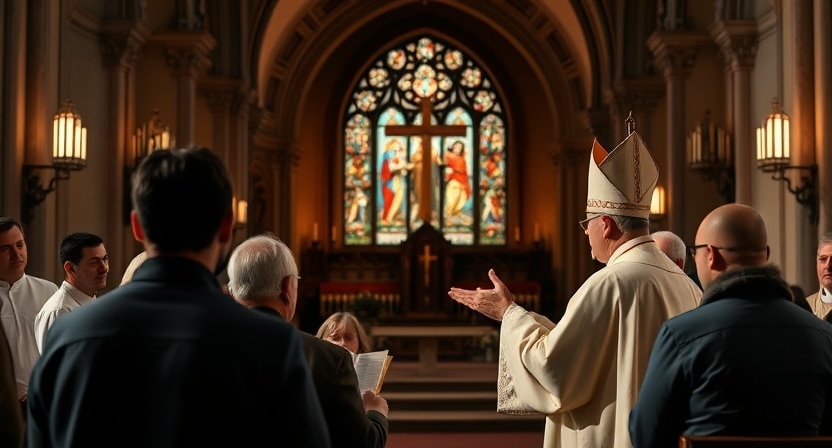FIRST SUNDAY OF LENT YEAR A
Dying to self
INTRODUCTION AND CONFITEOR
In today’s Gospel we see Christ in the desert, struggling with the tempter. Through prayer, fasting, and fidelity to the word of God he emerges victorious.
We all have to face temptations. Lent provides us with a great opportunity to intensify our efforts to overcome them. Let us reflect for a moment on our worst and constant temptation. [Pause]
Through the grace of Christ we too can be victorious over our temptations.
Lord, through the grace of this holy season you call us to repentance. Lord, have mercy.
Through the grace of this holy season you help us to die to self. Christ, have mercy.
Through the grace of this holy season you help us to renew our hearts and our lives. Lord, have mercy.
HEADINGS FOR READINGS
First Reading (Genesis 2:7-9;3:1-7). This deals with the tempting of Adam and Eve. In spite of all God did for them, at the first suggestion of the tempter, they disobeyed him.
Second Reading (Romans 5:12-19).. By his obedience to God, Christ undid the harm done by the disobedience of Adam.
Gospel (Matthew 4:1-11). This Gospel shows that, like us, Jesus had to struggle against evil. He was tempted in every way that we are, but he did not succumb.
1st Reading – Genesis 2:7-9; 3:1-7
7 The LORD God formed man out of the clay of the ground and blew into his nostrils the breath of life, and so man became a living being.
8 Then the LORD God planted a garden in Eden, in the east, and placed there the man whom he had formed.
9 Out of the ground the LORD God made various trees grow that were delightful to look at and good for food, with the tree of life in the middle of the garden and the tree of the knowledge of good and evil.
1 Now the serpent was the most cunning of all the animals that the LORD God had made. The serpent asked the woman, “Did God really tell you not to eat from any of the trees in the garden?”
2 The woman answered the serpent: “We may eat of the fruit of the trees in the garden;

3 it is only about the fruit of the tree in the middle of the garden that God said, ‘You shall not eat it or even touch it, lest you die.’”
4 But the serpent said to the woman: “You certainly will not die! No,
5 God knows well that the moment you eat of it your eyes will be opened and you will be like gods who know what is good and what is evil.”
6 The woman saw that the tree was good for food, pleasing to the eyes, and desirable for gaining wisdom. So she took some of its fruit and ate it; and she also gave some to her husband, who was with her, and he ate it.
7 Then the eyes of both of them were opened, and they realized that they were naked; so they sewed fig leaves together and made loincloths for themselves.
Responsorial Psalm – Psalms 51:3-4, 5-6, 12-13, 17
R. (cf. 3a) Be merciful, O Lord, for we have sinned.
3 Have mercy on me, O God, in your goodness;
in the greatness of your compassion wipe out my offense.
4 Thoroughly wash me from my guilt
and of my sin cleanse me.
R. Be merciful, O Lord, for we have sinned.
5 For I acknowledge my offense,
and my sin is before me always:
6 “Against you only have I sinned,
and done what is evil in your sight.”
R. Be merciful, O Lord, for we have sinned.
12 A clean heart create for me, O God,
and a steadfast spirit renew within me.
13 Cast me not out from your presence,
and your Holy Spirit take not from me.
R. Be merciful, O Lord, for we have sinned.
17 Give me back the joy of your salvation,
and a willing spirit sustain in me.
O Lord, open my lips,
and my mouth shall proclaim your praise.
R. Be merciful, O Lord, for we have sinned.
2nd Reading – Romans 5:12-19
Brothers and sisters:
12 Through one man sin entered the world, and through sin, death, and thus death came to all men, inasmuch as all sinned
13 for up to the time of the law, sin was in the world, though sin is not accounted when there is no law.
14 But death reigned from Adam to Moses, even over those who did not sin
after the pattern of the trespass of Adam, who is the type of the one who was to come.
15 But the gift is not like the transgression. For if by the transgression of the one, the many died, how much more did the grace of God and the gracious gift of the one man Jesus Christ overflow for the many.
16 And the gift is not like the result of the one who sinned. For after one sin there was the judgment that brought condemnation; but the gift, after many transgressions, brought acquittal.
17 For if, by the transgression of the one, death came to reign through that one, how much more will those who receive the abundance of grace and of the gift of justification come to reign in life through the one Jesus Christ.
18 In conclusion, just as through one transgression condemnation came upon all, so, through one righteous act, acquittal and life came to all.
19 For just as through the disobedience of the one man the many were made sinners, so, through the obedience of the one, the many will be made righteous.
Or Romans 5:12, 17-19
Brothers and sisters:
12 Through one man sin entered the world,
and through sin, death,
and thus death came to all men, inasmuch as all sinned.
17 For if, by the transgression of the one, death came to reign through that one, how much more will those who receive the abundance of grace and of the gift of justification come to reign in life through the one Jesus Christ.
18 In conclusion, just as through one transgression condemnation came upon all, so, through one righteous act, acquittal and life came to all.
19 For just as through the disobedience of the one man the many were made sinners, so, through the obedience of the one, the many will be made righteous.
Verse Before The Gospel – Matthew 4:4B
4B One does not live on bread alone,
but on every word that comes forth from the mouth of God.
Gospel – Matthew 4:1-11
1 At that time Jesus was led by the Spirit into the desert to be tempted by the devil.
2 He fasted for forty days and forty nights, and afterwards he was hungry.
3 The tempter approached and said to him, “If you are the Son of God, command that these stones become loaves of bread.”
4 He said in reply, “It is written:
One does not live on bread alone,
but on every word that comes forth
from the mouth of God.”
5 Then the devil took him to the holy city, and made him stand on the parapet of the temple,
6 and said to him, “If you are the Son of God, throw yourself down. For it is written:
He will command his angels concerning you
and with their hands they will support you,
lest you dash your foot against a stone.”
7 Jesus answered him, “Again it is written,
You shall not put the Lord, your God, to the test.”
8 Then the devil took him up to a very high mountain, and showed him all the kingdoms of the world in their magnificence,
9 and he said to him, “All these I shall give to you, if you will prostrate yourself and worship me.”
10 At this, Jesus said to him, “Get away, Satan! It is written:
The Lord, your God, shall you worship and him alone shall you serve.”
11 Then the devil left him and, behold, angels came and ministered to him.
HOMILY
Lent may not be taken as seriously as it once was. Even so, it still has a, great pulling power for all those who are serious about living a spiritual life. It provides a great opportunity and a great grace. Yet one gets the impression that it doesn’t achieve much. Perhaps our problem is that we don’t really know how to use it. We don’t know what to aim at.
Lent recalls the forty days Christ spent in the desert. He was about to embark on his real work in life – to bring the Good News to his brothers and sisters. He went into the desert to fast, pray, and reflect. Before setting out to help others he got himself right first.
In the desert he was confronted by the same basic temptation which confronts us all: whether to serve the true self or the false self, whether to seek honour and glory for himself or to seek honour and glory for God. In the desert he not only encountered God. he also encountered his true self. He made an irrevocable decision: to serve the true self and to do God’s will.
This desert experience came at a crucial moment in his life and at a time of great awakening. It would be impossible to exaggerate its importance for him. Later on, when people and events threatened to engulf him, he would steal off to lonely places to recover himself and rededicate himself to the Father. What he was doing was deepening this first desert experience. Now if we find all this a little too much for us, here is a more homely example.
A nun tells about something that happened to her when she was only twelve years old. One summer morning she was waiting for her friend to come over. But her friend was delayed, so she got annoyed and began to give out. complain, and generally to make a nuisance of herself. Finally her father could take it no longer. He told her to get a book, a blanket, and an apple. Then he took her in his car and drove her eight miles out into the country. There he left her, saying: ‘You’re not fit company for anyone. Stay here until I come back for you in the evening.’
At first she was very angry and full of defiance. She wanted to walk back, but the thought of her father’s anger made her change her mind. So she decided there was nothing for it but to settle down and let time go by. Even so, it took a lot of time for her anger to subside. Meanwhile she just sat there doodling, in a sulk. But slowly as time passed her anger died down. She ate the apple sitting under a tree.
As things quietened down inside her, she felt .more at peace. Then she opened her eyes to the world around her. She looked up at the blue sky, and around her at the beauty of the countryside. When she saw all this beauty she began to feel ashamed of her behaviour. She saw it as childish and selfish.
And surprisingly as her mood changed to one of peace and even joy, she realised that it was good to be alone. She got a feeling of her own goodness. At the same time she felt at one with the world around her, and had a distinct feeling of being close to God.
Time flew. By the time her father came for her she was almost a new person. She had grown like a young plant in the sun. She thanked her father for the risk he had taken, and for giving her an opportunity to grow. This experience had a profound and lasting effect on her. She grew to love solitude, and made a habit of seeking it at important and difficult moments in life.
This should give us some idea of what Lent could do for us. How we need it! We too must seek our true selves. But often we live almost completely for the false self. We live foolishly, superficially, and unspiritual, driven on by a multitude of senseless, stupid desires and habits. We are surrounded by noise and constant activity. We have no priorities. We lose ourselves. We are unable or unwilling to be alone, to be silent, to be still. And we wonder why we aren’t happy, why we don’t find it easy to get on with others, and why we can’t pray.
We cannot find ourselves in the crowd or in the hurly-burly of everyday occupations. We need to stand apart. We need solitude. But solitude can be realised, not just in the country, but anywhere. In solitude we come face to face with the basic option: to live for the false self or to live for the true self. Solitude helps us to identify the false self and to see the dominance it has over us. It also helps us to cast it off, so that the true, deep, and secret self can gradually emerge. In solitude we begin to stand on our own feet before God and the world, and accept full responsibility for our own lives.
The spiritual life is not in the first place a matter of saying prayers. The spiritual life is the life of one’s real self, the life of that interior self whose flame is often allowed to be smothered under the ashes of anxiety and futile concerns. The basic realities of this interior life are: faith, humility, charity, meekness, discretion, and self-denial.
We have to die in order to live more spiritually. But if we die it is only that we may rise to a new, deeper, fuller, and more spiritual life. This is why Lent has no meaning without Easter. We must keep our eyes on Easter. We must have a passionate longing for resurrection and renewal. The goal we are aiming at is to rise to a new life with the risen Christ.
‘People accept more readily outward penances than the task of changing themselves, or even examining themselves.’ (Hermann Hesse).
‘It is impossible to see one’s face in troubled water.’ (Thomas Merton).
PRAYER OF THE FAITHFUL
Let us pray that through prayer, self-denial, and attention to the word of God we may celebrate this holy season fruitfully, and so prepare well for Easter. R. Create a new spirit within us, O Lord.
For all the followers of Christ: that they may take the path of self-denial and renewal this Lent. [Pause] Let us pray to the Lord.
For all those who hold public office: that they may not seek their own interests and glory, but seek to serve others humbly and faithfully. [Pause] Let us pray to the Lord.
For all those who are totally enmeshed in the care and worries of this life, and who have no time or thought for the things of the spirit. [Pause] Let us pray to the Lord. ‘
That we may have the courage and strength to tackle our worst and constant temptations. [Pause] Let us pray to the-Lord.
For local needs.
Let us pray:
Heavenly Father, in your gentle mercy, guide our efforts at renewing our lives this Lent, for we know that left to ourselves we can do nothing. We ask this through Christ our Lord.
COMMUNION REFLECTION
The American writer, Thoreau,
lived for two years in the woods.
‘I went into the woods,‘ he says,
‘to confront the essential facts of life,
lest when I come to die
I should discover that I had not lived.
‘I did not read books the first summer;
I hoed beans.
Nay, often I did better than this.
There were times when I could not afford
to sacrifice the bloom of the present moment
to any work, whether of head or hand.
I love a broad margin to my life.
‘Sometimes in a summer morning,
I sat in my sunny doorway from sunrise till noon,
rapt in a reverie, amidst the pines,
in undisturbed solitude and stillness,
while the birds sang around me.
‘I grew in those seasons like corn in the night.
They were not time subtracted from my life,
but so much over and above my usual allowance.
‘It is not enough to be industrious;
so are the ants.
What are you industrious about?’


